Riches beckon from beneath Haiti’s hills. Mining companies are hoping to lock in huge tax breaks to get at them.
Read the full story at Guernica
Support from the Pulitzer Center on Crisis Reporting and Haiti Grassroots Watch.
Read the full story at Guernica
Support from the Pulitzer Center on Crisis Reporting and Haiti Grassroots Watch.

Farmer Remy Augustin, 54, prepares the ground to plant maize on a plot owned by his niece near Caracol, Haiti, December 10, 2019. Handout by Allison Shelley
A decade after an earthquake killed more than 200,000 people, farmers in Haiti are waiting to receive compensation for their land used to build an industrial park. Located in Haiti’s northern region, the $300 million Caracol Industrial Park opened in 2012 and now employs approximately 15,000 people, most of whom work in clothing factories there.
In 2018, farmers who had been evicted from their land in 2011 struck a rare deal with the IDB to provide Caracol’s 100 most vulnerable families with new, titled land.
Read the full story at the Thompson Reuters Foundation (PLACE). Reporting supported by The Pulitzer Center for Crisis Reporting.
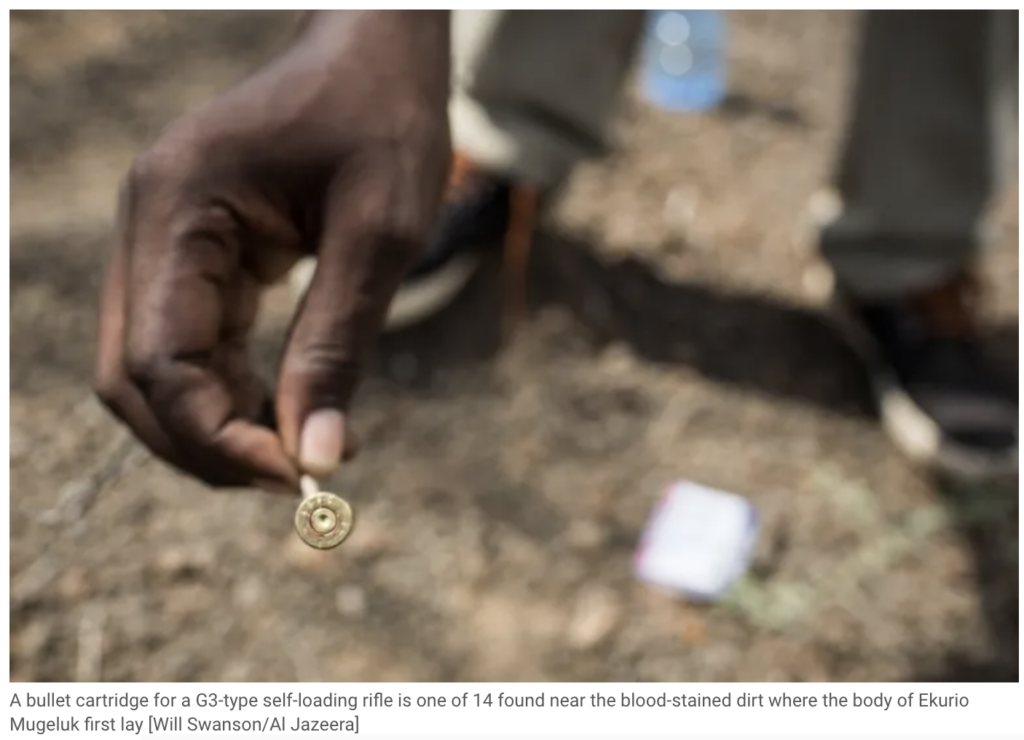 On the trail of police who stormed a village, burned down homes, stole livestock – and murdered an 80-year-old man.
On the trail of police who stormed a village, burned down homes, stole livestock – and murdered an 80-year-old man.
One May afternoon along a dirt road in a remote swath of Kenya’s Baringo County lay the remains of an elderly man. Wild animals had eaten his flesh, torn off some of his limbs, and dragged his body – now mostly bones. A purple shawl and a yellow football jersey clung to the skeleton.
 Witnesses say nine days earlier, several truckloads of police officers raided their village, burning their huts and stealing their goats. Officers then threw rocks at the elderly man who had tried to escape. They loaded him onto a truck, dumped him by the side of the road and shot him.
Witnesses say nine days earlier, several truckloads of police officers raided their village, burning their huts and stealing their goats. Officers then threw rocks at the elderly man who had tried to escape. They loaded him onto a truck, dumped him by the side of the road and shot him.
Reporting by Al Jazeera corroborates witnesses’ accounts that on May 9, Kenyan police murdered 80-year-old Ekurio Mugeluk and left his body to the wild.
Read the full investigation at Al Jazeera. Reported with Anthony Langat and Will Swanson.

Elias Kimaiyo says the Kenya Forest Service has burned down his home repeatedly as part of a push to evict him and other members of the Senger, an indigenous tribe, from the forests where they have lived for generations. “Most of the time,” Kimaiyo says, “I just live in fear.” / TONY KARUMBA
Another chapter in the World Bank’s fraught relationship with indigenous peoples who live on or near land targeted for development.
By Jacob Kushner, Anthony Langat, Michael Hudson and Sasha Chavkin
It was a morning routine: Elias Kimaiyo woke up, went outside his family’s mud-and-thatch home and climbed a hill. His goal: see where Kenya Forest Service officers were heading that day as they trudged into the forest from a nearby ranger station. Like thousands of his fellow tribespeople, he spent many of his days worrying about whether his family would be the next to be evicted by gun-toting rangers.
One morning in late 2011, Kimaiyo saw that KFS officers were heading in another direction. He went home and worked with his wife, Janet, harvesting their small corn crop in a clearing in the forest. In the afternoon, he decided to check again.
This time, when he climbed the hill, he could see a group of rangers heading toward his house. Kimaiyo ran home. He and his wife began grabbing their things—blankets, utensils, a mattress—and hiding them in the brush. They could see their neighbors’ homes burning. Kimaiyo’s one-year-old son sat in the dirt, crying, as his mom and dad carried armfuls of their belongings deeper into the forest.
Kimaiyo and his wife fled with their son to the other side of a river. They hoped the KFS officers would somehow miss their house in the dense forest.
They didn’t.
Kimaiyo watched, he says, as flames consumed his house and what was left inside—tables, chairs, the bed frame, even the mattress, which the rangers had discovered poorly hidden in the brush and tossed onto the fire.
It was the fourth time, Kimaiyo claims, that Kenya’s government had destroyed his home since the 2007 launch of a forest conservation project that the World Bank said would “improve the livelihoods of communities participating in the co-management of water and forests.”
Read the full ICIJ investigation.
This is the latest installment of “Evicted and Abandoned,” an examination of the hidden toll of development financed by the World Bank. The project is a collaboration between the ICIJ and The Huffington Post, with contributions from journalists around the globe. The story also appeared at The Huffington Post and PRI’s The World.
In recent decades, Western media has tended to place the blame for Africa’s problems overwhelmingly on African shoulders. Given portrayals in the mainstream press, for example, one could have been forgiven for thinking that Robert Mugabe’s ongoing state plunder in Zimbabwe or the Joseph Kabila administration’s secret mining deals in Congo were purely African scandals, manufactured by Africans without any outside help.
And yet a subtle shift in western media’s coverage of Africa is underway: today many news outlets are making great efforts to uncover the ways in which foreign corporations and actors from North America, Europe and Asia are central to corruption on the continent.
Read the full story at the Columbia University Covering Business blog.
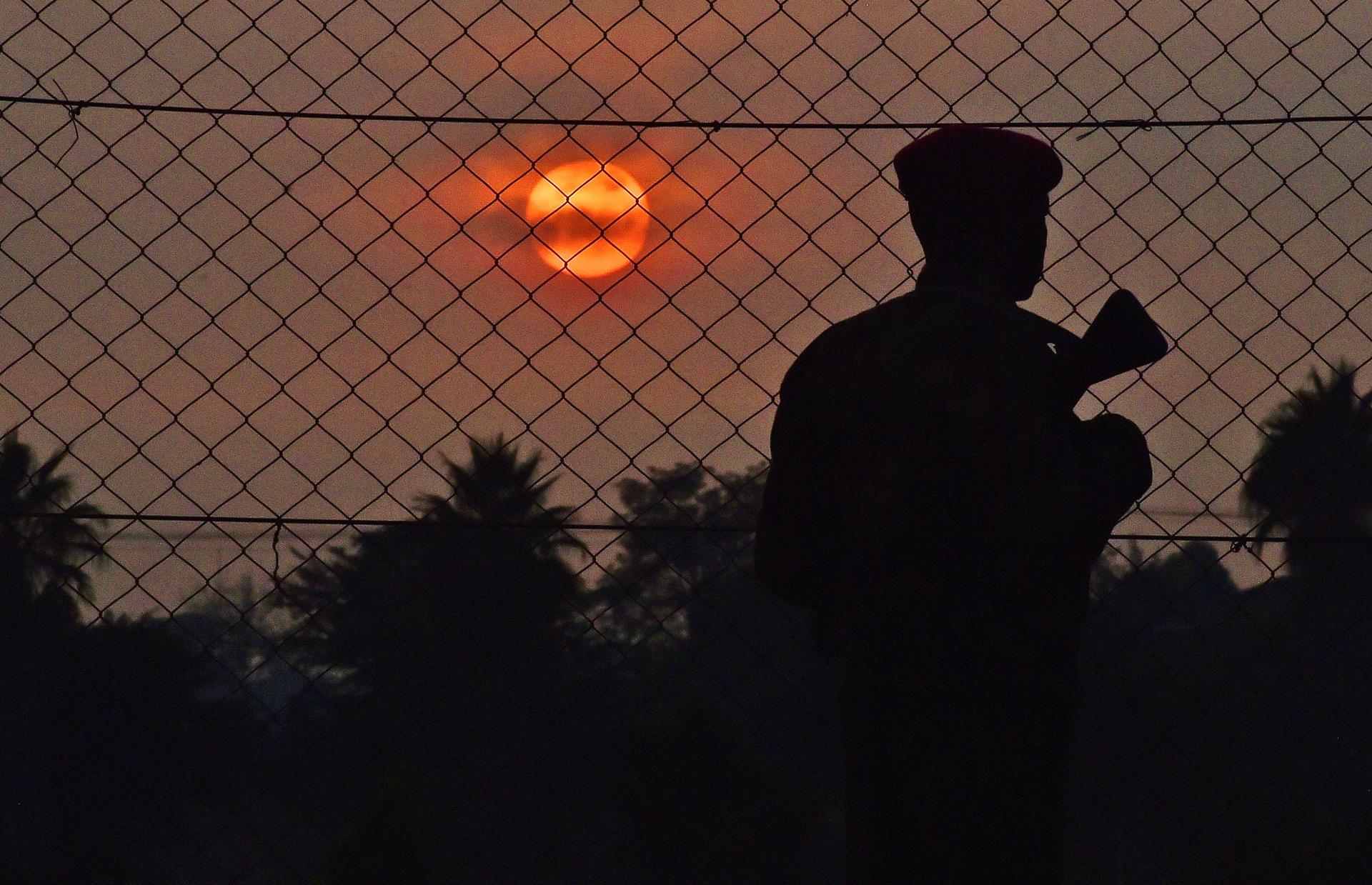 NAIROBI, Kenya — Kenyan police have fueled the fires of Islamic extremism and may actually be undermining the country’s security in an overzealous attempt to protect it, according to human rights activists and advocates for police reform.
NAIROBI, Kenya — Kenyan police have fueled the fires of Islamic extremism and may actually be undermining the country’s security in an overzealous attempt to protect it, according to human rights activists and advocates for police reform.
Widespread allegations of police corruption, brutality and arbitrary arrests that target Kenya’s Muslim minority population appeared to inform President Obama’s comments in a joint press conference with Kenyan President Uhuru Kenyatta on Saturday, part of Obama’s first trip to his father’s homeland since becoming president of the United States.
“What we have found through hard experience — I have shared this with President Kenyatta — is that if you paint any particular community with too broad a brush, if in reaction to terrorism you are restricting legitimate organizations, reducing the scope of peaceful organization, then there can have the inadvertent effect of actually increasing the pool of recruits for terrorism and resentment in communities that feel marginalized,” Obama said.
Read the full GroundTruth story at PRI’s The World.
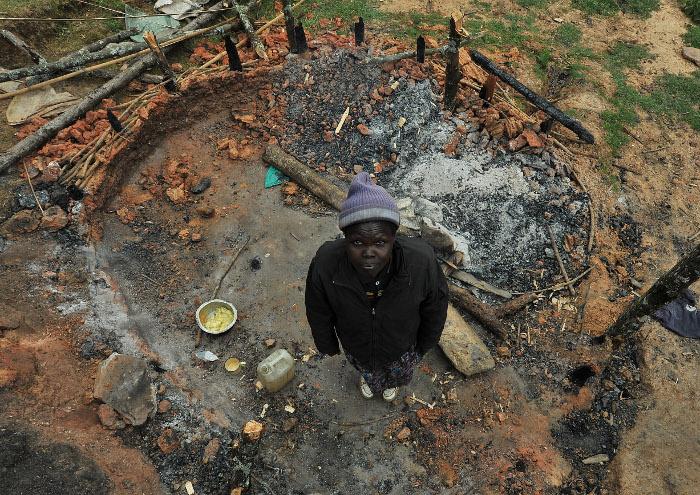
By Jacob Kushner, Anthony Langat, Sasha Chavkin and Michael Hudson
Gladys Chepkemoi was weeding potatoes in her garden the day the men came to burn down her house.
After her mother-in-law told her that rangers from the Kenya Forest Service were on their way, Chepkemoi strapped her 1-year-old son on her back and hurried to her thatched-roofed home. She grabbed two tins of corn, blankets, plates and cooking pans, and hid in a thicket.
She watched, she said, as the green-uniformed rangers set her house ablaze.
After they were gone, she came out of the thicket to see what was left.
“What used to be my home was now ashes,” she said.
The young mother is one of thousands of Kenyans who have been forced out of their homes since the launch of a World Bank-financed forest conservation program in western Kenya’s Cherangani Hills. Human rights advocates claim government authorities have used the project as a vehicle for pushing indigenous peoples out of their ancestral forests.
They are not alone.
In developing countries around the globe, forest dwellers, poor villagers and other vulnerable populations claim the World Bank — the planet’s oldest and most powerful development lender — has left a trail of misery.
Read the full ICIJ investigation.
This is the latest installment of “Evicted and Abandoned,” an examination of the hidden toll of development financed by the World Bank. The project is a collaboration between the ICIJ and The Huffington Post, with contributions from journalists around the globe. The story also appeared at The Huffington Post and PRI’s The World.
UPDATE: This investigation won the 2015 Online News Association Award for Investigative Journalism.
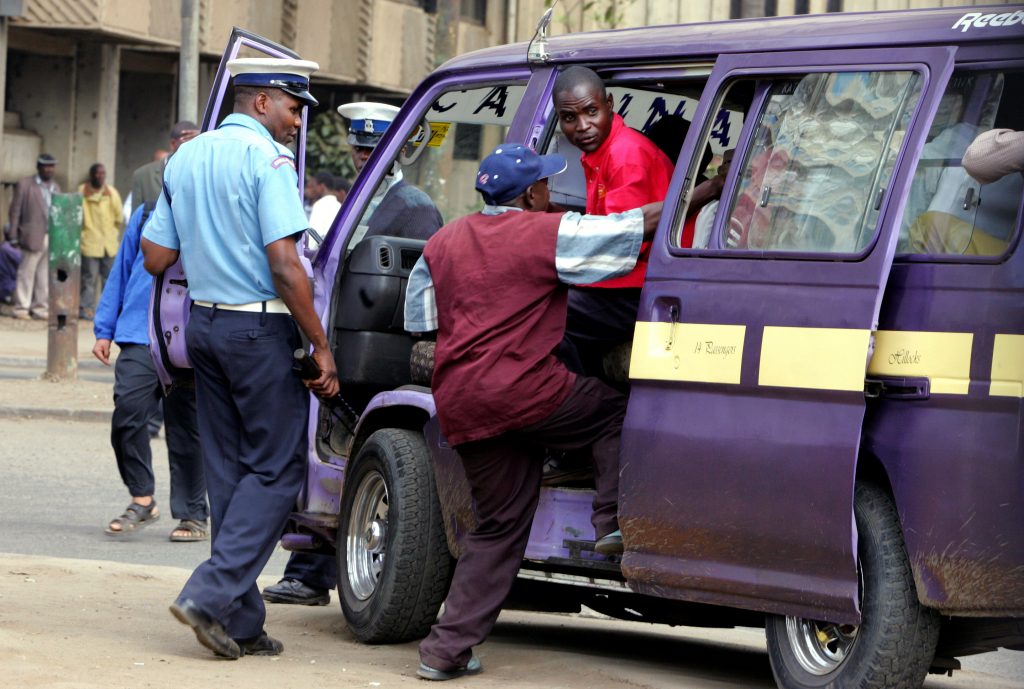
01 Sep 2006, Nairobi, Kenya — A Kenyan policeman board a minibus (Matatu) after the vehicle was stopped for a traffic offence in the capital Nairobi September 1, 2006. Thousand of Kenyans mobbed private minibuses, throwing elbows and squirming onto the loudly painted vehicles across the nation on Friday after a government push to enforce safety rules left many without transport. REUTERS/Antony Njuguna (KENYA) — Image by © ANTONY NJUGUNA/X90056/Reuters/Corbis
Even the smallest of bribes can stifle an economy when they’re magnified millions of times over.
When a police officer gets caught soliciting a bribe, most people would tend to blame the cop. In Kenya, the government is trying a new approach: clamping down on the people whopaythe cop.
And they’re going about it in a strange way, ordering that Nairobi’s public matatus— the beat-up, privately owned vans that ferry most of the city’s commuters — go high-tech. Passengers are being asked to use popular mobile banking applications like m-pesa to pay the fares. No more cash-carrying passengers, no more bribes, the thinking goes.
Many in Kenya say government officials aren’t naïve in their hope to stem corruption this way — they’re just plain lazy. High-tech solutions like digital fare cards or mobile phone payment apps abound. But Kenya may be no exception to the rule that ending bribery must begin and end with old-fashioned justice for the people who solicit the bribes.
new balance heart rate monitor
Read the full story at OZY.
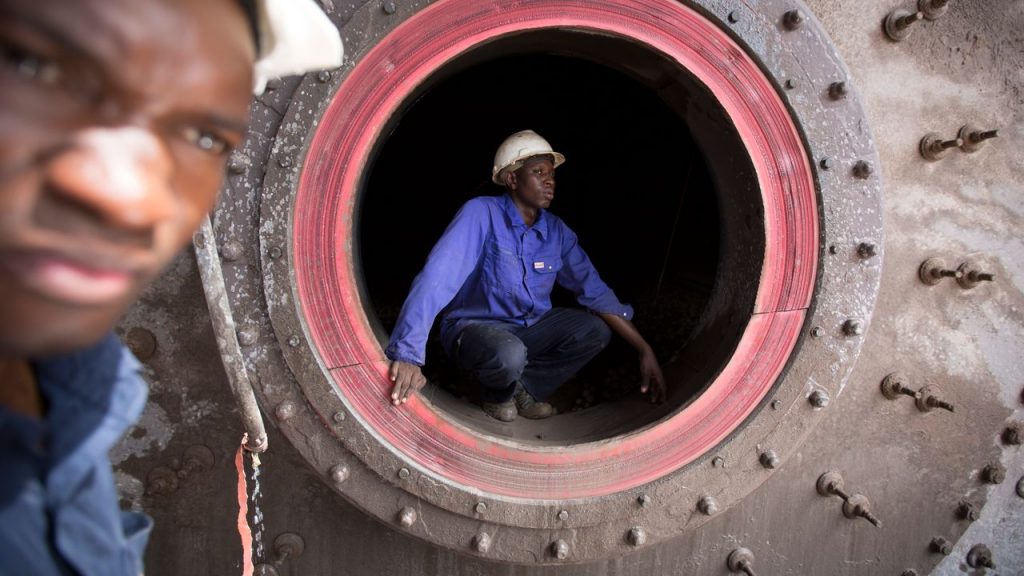
SIMON DAWSON/BLOOMBERG/GETT
In the 19th century, foreign explorers came to Africa in search of ivory, rubber and slaves. Today, they come for Africa’s minerals — its copper, zinc and tungsten. The developed world needs them for its skyscrapers, cell phones and much in between.
The exchange is sometimes unfair. Often, African governments don’t know the value of the natural resources underground, but mining companies from the West — and, increasingly, China — do. That knowledge asymmetry has cost African countries and their citizens as much as $1.4 trillion over the past 30 years.
coach patchwork purse
But a more level playing field may be in sight, thanks to a World Bank initiative that aims to compile Africa’s mineral maps into a single, public database: the so-called Billion Dollar Map. The goal is to give African nations as much information as possible about their natural resources so that they can earn a fair price for the minerals they sell, World Bank officials say.
While mineral maps of the African continent exist, most are private or piecemeal. The Billion Dollar Map is crucially different: Its contents will be available to the public. And that, experts hope, will minimize underpricing and corruption, and help governments get a fairer price for their countries’ resources.
Read the full story at OZY.com
In the nation’s public sector, there are huge disparities between the highest earners and the low. Now, Kenyans are fighting over who should take a cut.
Anthony Langat and Jacob Kushner
NAIROBI, Kenya—Kenya’s President Uhuru Kenyatta ignited a nationwide debate over government employee wages this month when he surprised the country by announcing he would reduce his own salary by 20 percent.
The move signaled the beginning of a fierce debate over government wages, which are rising out of control: This year, public sector salaries are expected to eat up 54 percent of all tax revenue and equal 13 percent of the nation’s GDP, according to cabinet secretary in charge of the Treasury, Henry Rotich.
louis vuitton totally mm
“The recent growth in public sector wage bill is unsustainable and unacceptable,” Kenyatta said in a March 10 speech that sparked the wage debate. “If we maintain this trend we would be dedicating an ever larger share of the wealth we produce as a country to the remuneration of public servants.”
Read the full story at GlobalPost.

Samwel Wambiri stands in his home located on the Tassia II land, on the outskirts of Nairobi, Kenya. (Jacob Kushner/GlobalPost)
A botched investment by Kenya’s social security agency may delay workers’ retirement benefits, make a Chinese construction firm richer and leave thousands of small landowners with nothing.
By Anthony Langat and Jacob Kushner
macys coach bags
NAIROBI, Kenya—This, says Samuel Wambiri, is how corruption can disrupt a life in Kenya.
Ten years ago, the 54-year-old father of three purchased a small plot of land on the outskirts of Nairobi for a modest 315,000 shillings. That’s about $3,700, which Wambiri agreed to pay over 10-years. And upon that land, Wambiri built a home where he and his wife could retire.
But last month, just as Wambiri had finished paying it off, the agency that sold him the land announced some troubling news: Wambiri would have to pay 920,000 shillings, or $10,824 more — four times more than his original investment. That’s because the Nairobi County governor decided Kenya’s National Social Security Fund (NSSF), which sold the land, needed to build a sewage system and access roads through it at significant cost.
The NSSF announced it would transfer the cost of the utilities to the landowners themselves.
“I was happy that I had finally finished paying for my land,” Wambiri said. “I was looking for somewhere to settle, and I settled.”
louis vuitton handbags on sale
But now, Wambiri and an estimated 5,500 fellow small-parcel landowners in Nairobi’s Tassia II neighborhood may be forced to vacate their new land altogether if they don’t find a way to pay the bill.
Read the full story at GlobalPost.

Sacks of American rice for sale at a Port-au-Prince market. (Jacob Kushner/GlobalPost)
PORT-AU-PRINCE, Haiti — The idea that the delivery of American food aid needs an overhaul goes almost without question here in the capital of a nation still recovering from the devastating earthquake of four years ago.
Farmers in Haiti and many of their counterparts in the United States are joining foreign aid organizations calling on the United States to stop sending American crops to Haiti through what many critics say is the deeply flawed and wasteful strategy of the current, multi-billion-dollar US Department of Agriculture Food for Peace program.
“Unfortunately US policy doesn’t consider first the political interests of farmers abroad, but of its own,” said Camille Chalmers, director of a Haitian farmers’ association.
“But now there is a chance to change that,” he added.
nike shox pink
Read the full article at GlobalPost.

A 20-year-old Somali refugee demonstrates the gate to her family’s apartment that a Nairobi police officer threatened to break open before the family paid him a 2,000 Kenyan shilling ($25 US) bribe to leave. (Jacob Kushner/GlobalPost)
NAIROBI, Kenya — In the middle of a crowded downtown street stand two hundred men and women, listening to a religious debate between a Muslim cleric and a Christian priest.
The two take turns shouting into a microphone that amplifies their voices to the curious onlookers: ‘The Bible says…’ the priest begins. The cleric responds, “The Koran says…” and so on.
The ritual has become a daily phenomenon as Christians and Muslims come together to discuss their religions here in Eastleigh, the heart of Nairobi’s Somali Muslim community. But this religious debate held a special significance Monday, exactly one month after gunmen including at least one Muslim of Somali heritage began their deadly siege of Nairobi’s Westgate shopping mall.
Read the full story as it appeared at GlobalPost.
Last January I was in the Democratic Republic of Congo (DRC) to research Sicomines, China’s controversial $6.5 billion megadeal in which Chinese companies will construct roads, schools and hospitals in exchange for mining and untold billions of dollars worth of copper and cobalt with Congo’s state mining agency.
On a sunny morning in the south-eastern mining city of Lubumbashi, I called a Congolese official to pose some hard questions about the deal – particularly, what happened to the $350 million ‘signing bonus’ that was handed over by the Chinese. But I hardly got a word in before his response betrayed his fear as to the more sensitive concern on his mind: “Is this about COMIDE?”
It wasn’t, of course. But perhaps it should have been, because the corruption scandal that burns hottest among Congolese officials today has nothing to do with the Chinese. In 2009, the International Monetary Fund started a $551 million loan to improve the DRC’s business climate through a series of projects. As a condition of the loan, Congo’s government would have to make all its mining contracts and transactions public.
So it must have come as a surprise to the IMF when Bloomberg revealed the DRC had sold its 25% stake in a copper mining venture called COMIDE SPRL – a trade the Congolese government hadn’t disclosed. The IMF responded to the news by refusing to renew the loan, meaning the DRC will essentially forfeit an incredible $225 million because a few Congolese officials didn’t want the world to know what they were up to.
Read the full story as it appeared at Think Africa Press.
For thirty years almost without pause, governments in Khartoum – the capital of Sudan — have fought against their own people. The North-South civil war, which killed an estimated two million people and displaced four million more, ostensibly ended in 2005 with the signing of the Comprehensive Peace Agreement that allowed for the ethnically diverse South to succeed last year from the Arab-controlled North. But even if that conflict reignites as recent fighting indicates it might, the Sudanese government is now facing a new and even harder-to-combat opponent: its own people in the Northern cities which the government has long counted on for support.
Read the full story as it appeared at the Foreign Report.